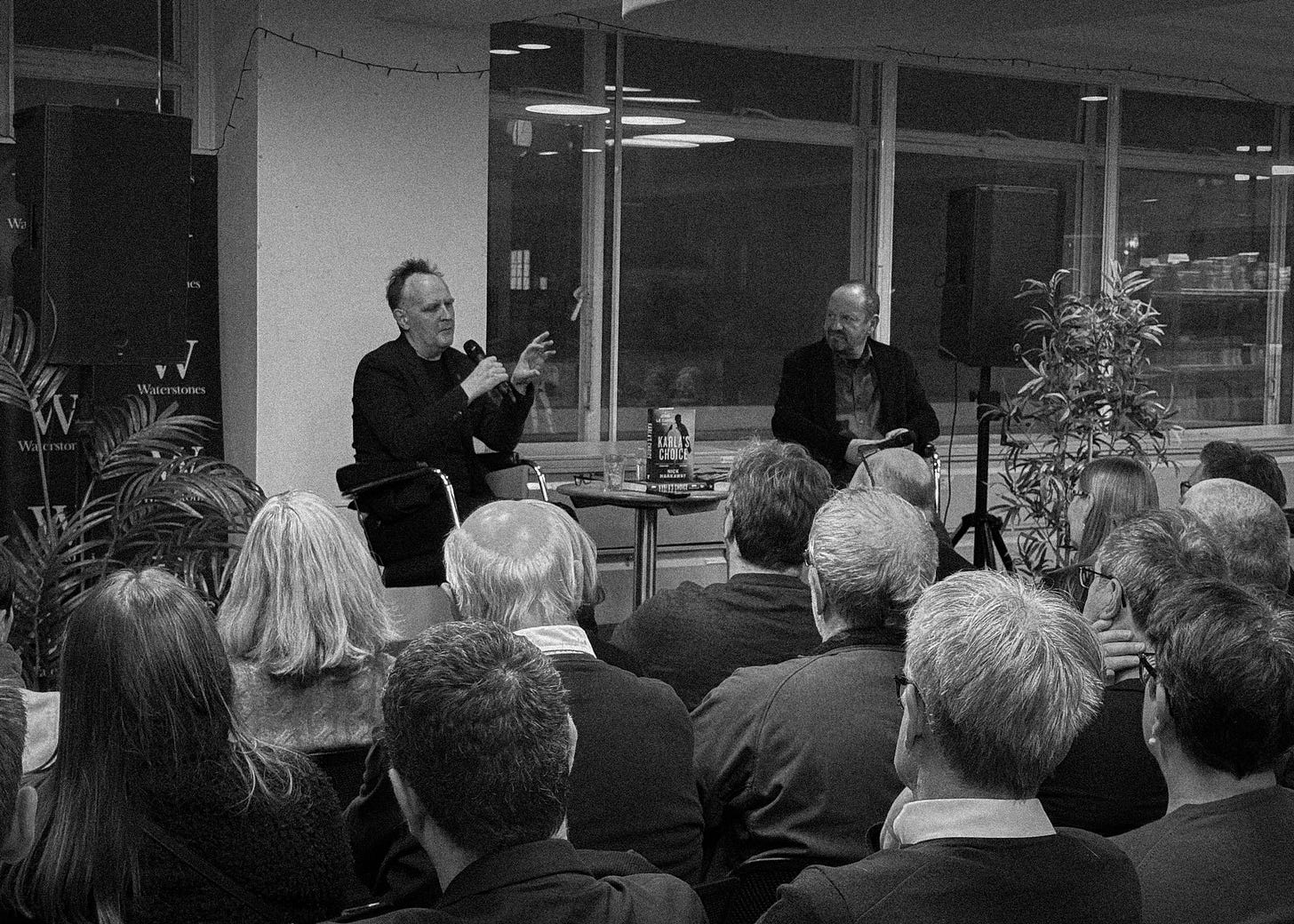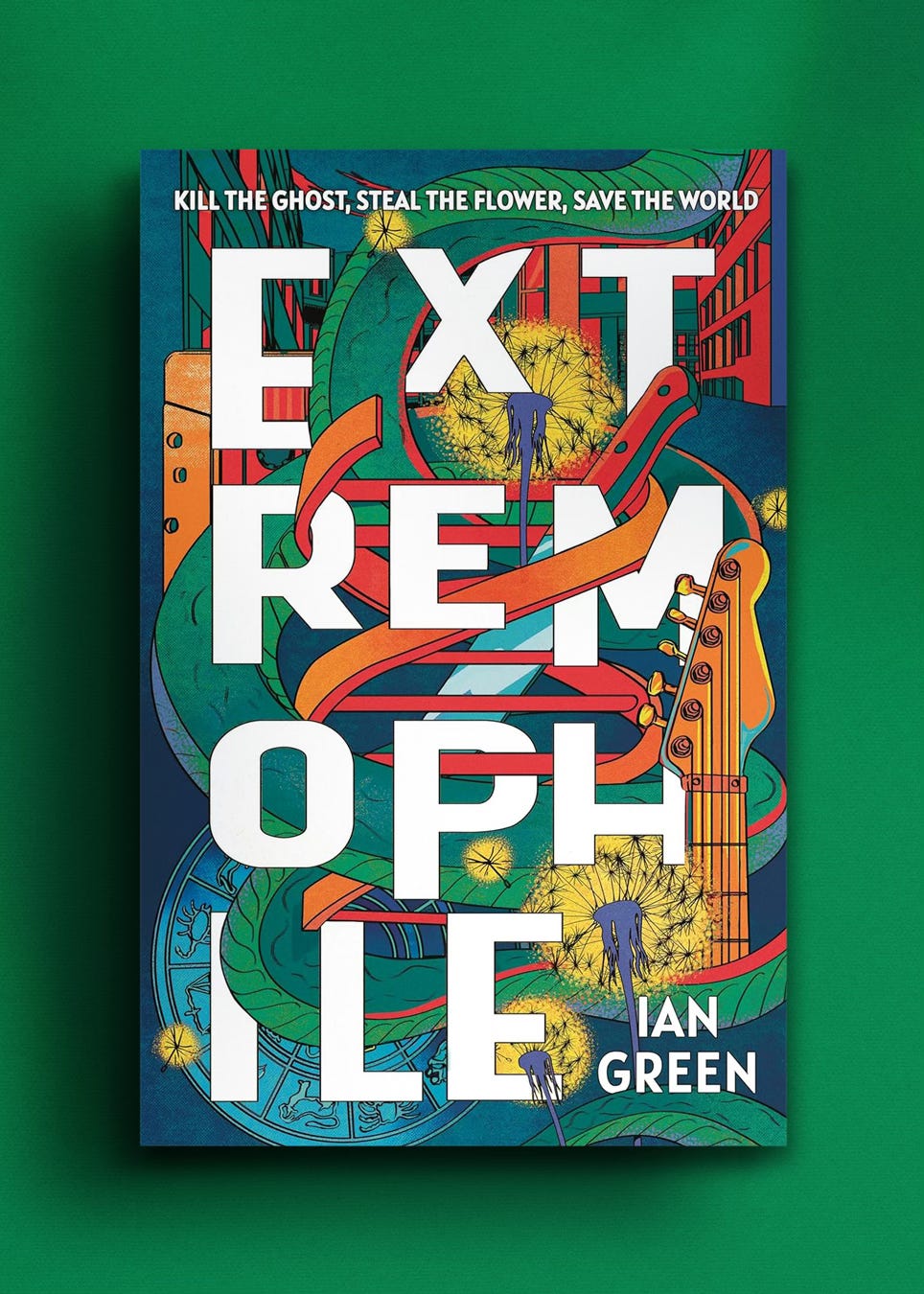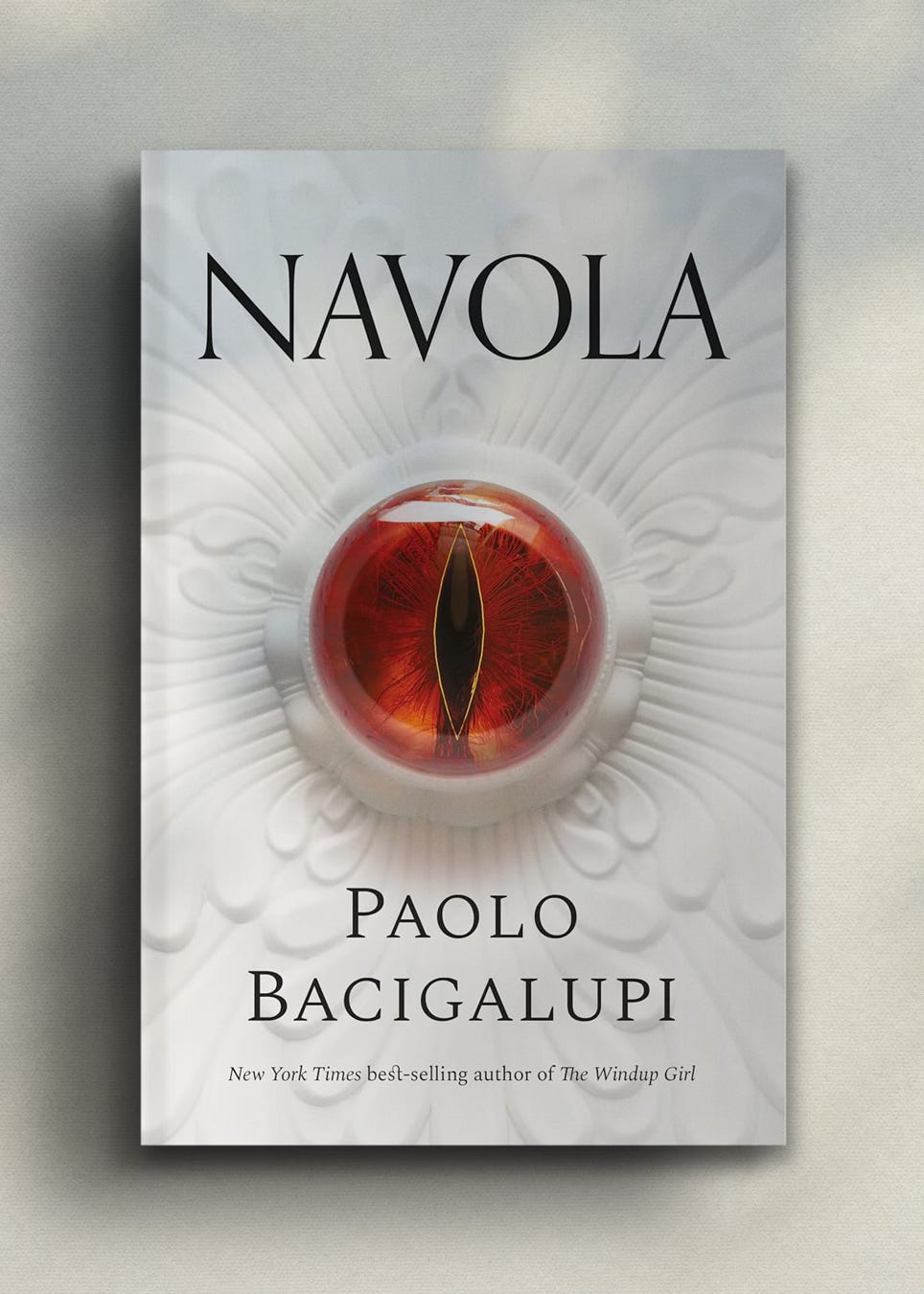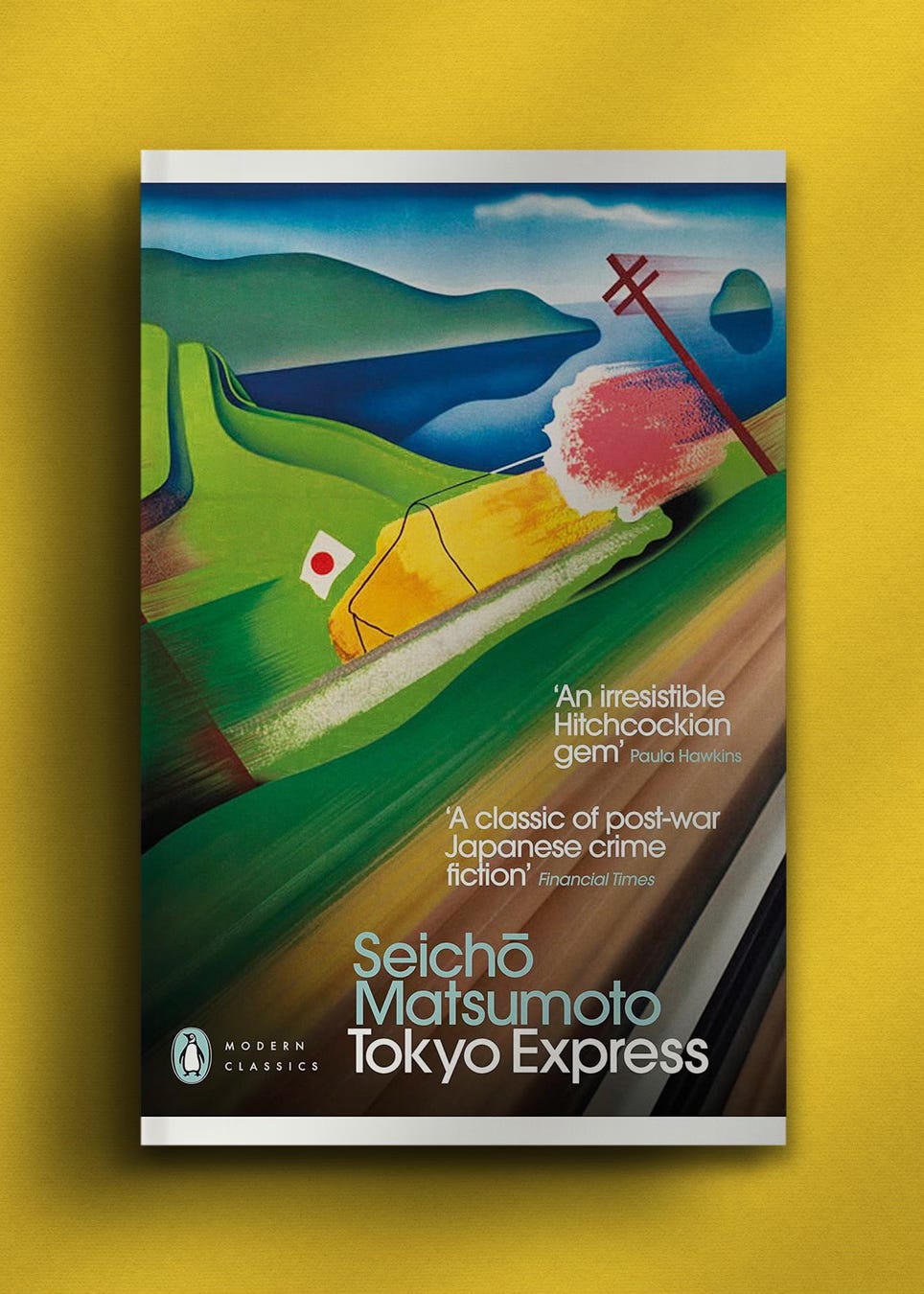The Acosta Dispatch #2 – On location, bio-hacking & the Magic Castle
December 2024's monthly update from Jordan Acosta, a British-Filipino speculative fiction writer.
About me
I'm a British 40-something speculative fiction writer, professional designer and creative director based near London. Over the last five years, I’ve worked on drafting my debut novel, Dark Century. The Acosta Dispatch is my monthly newsletter, published on the first Thursday of the month.
Format
Topics are broken down into:
CABLE – News & events;
MINUTES – On Writing & Publishing;
VETTING – The Month's Reviews;
POSTINGS – Elsewhere, On/Off-line;
INTERCEPT – Quote of the Month
CABLE –
News & Events
I’ve moved the Acosta Dispatch to Substack.
In the great exodus from Twitter/X during November 2024, where to next? Substack has come a long way since I last spent any time on the platform, integrating a social media ecosystem called Notes which is very handy. After launching my work newsletter in Substack, also called The Dispatch (entirely coincidental, and not by me), our audience of long-form readers have begun to rapidly accumulate.
Due to the way my website platform’s pricing works, in addition to a lack of discoverability by a long-form reading audience, it made sense to port over the newsletter function to Substack for the foreseeable future.
So far, so good. Further down the line, there’s opportunities to share things like essays, or even short fiction. We’ll see.

In other news, the dreaded house move continues, crawling to a standstill due to factors that can only be explained, it appears, by a conveyance solicitor. As anyone will tell you, house moves are incredibly stressful but (slow) progress is being made. It also transpires packing, labelling, organising, moving and re-arranging book boxes en masse is an exhausting task.

Despite having to cancel bookish and social events throughout November, I did trek to London to gatecrash Nick Harkaway in conversation with Philippe Sands on the process of writing Karla’s Choice, a story set in John le Carré’s Cold War, which I reviewed last month in Edition #1. As ever, Nick’s irreverent and casual demeanour belies his brilliant and poignant prose. As a collector of both Harkaway and his father’s works, I’m pleased to have my copies of the book signed by the man himself.
MINUTES –
On Writing & Publishing
Creating constraints in a setting
I’m currently plotting a short story in the same setting as Dark Century; which will come as a surprise to some, not least to my literary agent, John, who’ll be reading this on his way to work.
Here’s the first iteration of the pitch:
They told her she was blind, until she saw the ghosts. Now, the King’s Men call her Fox, but Kei dreams of a life beyond the Walled City. When she makes the acquaintance of a præst from the Danish Faith, the dream of New Eden becomes Kei’s obsession; if only she can escape the long shadow of the Vermillion King.
Why this, and why now, I hear you murmur, when I have an entire novel to edit first?
A little-discussed facet of the publishing industry is time spent waiting around for things to happen. In my case, the ongoing house move has disrupted my personal, work and writing schedules, and it’s doubtful I’ll be getting through edits this side of Christmas. Then, there’s a whole other bit after that – namely, being able to sell the book to a publisher.
That’s all in the future, but in the meantime, my brain continues to throw out ideas which I dutifully jot down, mentally carving out blocks of time to do something about them. My intention for this short story is a way to fill this gap in my writing schedule, as I wait and see what happens with Dark Century.
So how, exactly, do I figure out what to write about?
My particular brand of story generation emerges out of thinking about an interesting location, before any other considerations, like characters or even the story itself. With Dark Century, the novel’s plot fell out of thinking about who would benefit long-term from climate change. Along with the usual suspects across the global (far) north, the emergence of Denmark as a surprising contender provided me with a rich setting, where I could fill some gaps and hint at others.
In fact, after dreaming up the basic premise of ‘17th century witch hunts collides with the Cold War’, the very first thing I did was redraw the world’s geography – literally and politically – and the entire plot for Dark Century fell out of that one design exercise, once I decided to set it in a version of Greenland.
In the same vein, beyond an intention to write something new in the same setting as Dark Century, my biggest concern was that I could write about anything.
What I needed were constraints.
There was consideration to writing tie-in stories from the perspective of secondary characters connected to the novel, but nothing seemed to stick; that is, until I had an interesting location take root in my mind. It’s a place I could draw on personal experience, and like Dark Century before it, things suddenly clicked together; emerging as a series of cinematic vignettes in my mind, like cut scenes in the 1995 anime Ghost in the Shell [0:12 onwards].
This mood – dictated by the physical location – sets the tone for what happens next; and with that, characters and the beginning of a plot follows.
Other constraints are imposed: for example, a short story by its own defined conventions has a word limit of up to 7500 words. It may stray into novelette territory if I stretch the word count even further. I’m also thinking of a possible medium for delivery – like Substack – which gives me a framework to figure out exactly how I’m going to tell this new story. I also want it to tangentially link to the events of Dark Century, because I want to generate interest in the novel by enticing new readers.
All of these restrictions propel the story forward in an exciting way. I’m not a discovery writer by nature; that is, someone who begins to write and sees where it takes them. Instead, I’ll start filling in the gaps after I decide on a location, and plot a strong thread to link these disparate vignettes together, inserting my evolving cast into them. If there is any discovery, then it’s the point at which I’ll do the actual writing, knowing I have a trajectory, because it was planned that way.
This process doesn’t end with this story; it’s how I also generate potential ideas for future novels, too. In the meantime, I’m going to wait and see how this yet-to-be-titled story pans out.
VETTING –
The Month's Reviews
A quick note: whilst I currently don't do affiliate links – this may change to help offset costs – I will link to books available for sale online, or other things like Patreon, because they were genuinely worth my time.
EXTREMOPHILE by Ian Green
(Head of Zeus, 2024)
Her skin shimmers and the lines flicker under the buzzing light, first a silver sheen, then a pulsing vibrant red. It takes me a moment to realise my shock – I’ve seen plenty more garish displays. But this isn’t glitz fabric, or a silicone body mask, or some filigree of translucent exotic material, or a tattoo with embedded silicone beads with frequency controlled fluorophores. This is biology – this is real.
Can’t get this anywhere else, Renault is saying to the crowd, double dragon exhaling his cigarette smoke from his nostrils to accentuate his point. This is genuine engineered squid chromatophores, totally tailored to her genome.
It’s two decades ago. I’m in a decaying room in a squat somewhere in London with my hardcore band Kill the Lights, shedding my bodyweight in sweat. Around me, Sean, Chris, Ross and Mat are thrashing hell-for-leather to a raucous crowd who seem to know the lyrics. They probably don’t (and neither do I), but who cares? Everyone’s trying to avoid the massive hole in the floor to one side of the stage.
EXTREMOPHILE (it deserves to be capitalised) is the literary equivalent of that gig. Two of the novel’s protagonists play in a band with energy not too dissimilar to my old one, except none of us are genius-level biohackers. What follows is a mind-boggling series of heists carried out by the most unlikely bunch of misfits in a terrifyingly plausible version of London, reminiscent of Paolo Bacigalupi’s multiple-award-winning climate tale, The Windup Girl (Orbit, 2010).
Except everything is turned up to 11 – nay – 12.
This book is intense, and it took me a few sittings to get through it. Green has written one of the most memorable ensembles I’ve ever read in a book: Charlie, Parker, Mole, Scrimshank, Zoot, Chef and Ghost leap out from the pages for the sole purpose of dragging you head first into an authoritarian world populated by corporate-sanctioned hyper-violence, and the all-too-human resistance which stands against it.
It’s one hell of a ride, and Party rules apply.
A nice edition of Extremophile can be bought on The Broken Binding’s website.
Navola by Paolo Bacigalupi
(Head of Zeus, 2024)
My father shrugged in that way that only a Navolese can. The shrug of a man who does not care, who is listening, who might walk away, who might (as Merio liked to say) steal your wife, who might give you the finest wine in his cellar, who might be your greatest friend, or your most dangerous enemy, all depending upon what you said next.
There was a sparring occurring between my father and this man, a subtle vying for advantage. Each of them outwardly calm and yet engaged in the thrust and parry of faccioscuro. I felt goosebumps upon my skin as they both leaned their elbows upon the balcony rail and studied the view.
It turns out Bacigalupi took a long break from writing after The Water Knife (Orbit, 2015), citing burn-out from the climate-extrapolation which populate his books like the aforementioned The Windup Girl; a story which partly inspired the setting of my own novel. When I learned Bacigalupi was returning with a fantasy novel, my curiosity was piqued, for how does an established novelist make a mark in an arguably over-saturated genre market?
The answer, perhaps, lies in the fundamental shape of the story. Navola, ostensibly a secondary-world fantasy based on Renaissance Italy, is anything but a run-of-the-mill quest storyline. The story’s naive protagonist, heir-apparent Davico, must navigate the threats and political intrigues of his clan, the di Regulais (the eponymous nation’s premiere banking family); regaled with an oddly-paced narrative which feels, at times, more creation myth than modern fantasy.
By the novel’s end — after an explosive third act — a reader might think they were reading a novelised version of Machiavelli’s 16th century political treatise The Prince. Whilst I do prefer books which don’t dangle too many threads for a possible sequel, in Navola’s case, I’m looking forward to reading what comes next.
Tokyo Express by Seichō Matsumoto
(Penguin Classics, 2022)
Of course, no detective worth their salt ever wants to abandon a case… The number of cases I have worked on during that period astounds even me. Fortunately, my career has been a relatively untroubled one – and yet, I have left plenty of cases unsolved. Looking back, there are all sorts of things I wish I’d done differently. In every instance, however, it comes down to the fact that I just didn’t persevere. I kick myself, thinking: I could have cracked that case, if I had only stuck at it a little bit longer. Sometimes all it takes is the tiniest extra push in exactly the right place.
Tokyo Express is a slim volume. Its comparatively short length makes it the perfect palate cleanser between longer books, and I’m always up for a Japanese mystery novel. What it lacks in word count, it makes up for in punch. Set in 1950s Japan, Inspector Mihara is a young but persistent detective for the Tokyo Metropolitan Police, investigating what appears to be a lovers’ suicide pact in Hakata in the deep south. Mihara’s suspicions are roused by a suspect, whose iron-clad alibi places him on the other side of the country in Hokkaido. Or does it?
There’s an extraordinary amount of fine detail to sift through, and at times, reading it feels like studying a printed train timetable which features heavily in this meticulously and ingeniously plotted murder mystery.
The Florida Project
(Dir: Sean Baker, 2017)
Bobby: It's only the second week of summer and there's already been a dead fish in the pool.
Moonee: We were performing a science experiment. We were trying to get it back alive.
The subscription to MUBI is worth the price of entry to watch films like The Substance, which I reviewed last month. The Florida Project gives us glimpse into the lives of residents living in a budget hotel called the Magic Castle; seen through the perspective of Moonee (Brooklynn Prince), a boisterous six year old and her friends. Moonee’s mother Halley (Bria Vinaite) is a stripper struggling to make ends meet, coming into regular conflict with Bobby Hicks (Willem Dafoe), the perpetually exasperated building manager of the Magic Castle. With a dwindling cashflow, Halley turns to increasingly desperate measures to pay the rent, culminating in a fraught standoff between Moonee and the Florida Department of Children and Families.
Despite all of the calamity and hopelessness in the shadow of Walt Disney World, there’s a strong thread of affection and humanity running throughout, which makes for compelling viewing.
POSTINGS –
Elsewhere, On/Off-line
I want authors to not let the unspoken penalties drive them into choices, but to use the understanding that comes from that to design a viable life and career for themselves. Because let’s face it: only a stroke of luck or an alignment of the stars or the perfect cultural moment can surmount historically inequitable practices and good old marketing money.
– Suyi Davis Okungbowa, Against Performance
The history of witch trials clearly shows us what happens when technology-fueled misogynistic propaganda gets out of control. It can terrorise entire societies, isolate its victims, discourage resistance, and make people follow along because ‘everyone else is doing it.’ And it doesn’t just lead to social polarisation, but to violence. We might not be burning women at stake anymore, but the rates of gender-based intimate partner violence, sexual violence and online harassment remain staggering.
– Katie Jgln, The Noösphere: How the Printing Press Ignited Europe’s Deadly Witch-Hunt Frenzy
The monsters of chaos are still fresh from the primordial ooze and still hold dominion over the land, yet to be vanquished by roaming culture heroes as barbaric as the leviathans they oppose. The kingdoms of the epic fantasy are still being built. The wilderness is yet to be tamed and colonised by those more ‘civilised’.
– Alec Worley, Agent of Weird, Evolve or Die: Is this the End for Sword and Sorcery?
INTERCEPT –
Quote of the Month
“As I grow older, may the Emperor protect me, I find I measure my history in terms of milestones, those occurrences of such intense moment they will never pass from one’s memory.”
– Gregor Eisenhorn
Malleus, by Dan Abnett (Black Library, 2001)
Many thanks for reading. The Acosta Dispatch is a monthly newsletter published on the first Thursday of every month by Jordan Acosta, a British-Filipino speculative fiction writer. You can subscribe at jordanacosta.co, and read previous editions, here.
If you no longer wish to receive emails from me, there’s an unsubscribe link at the bottom of this email.










